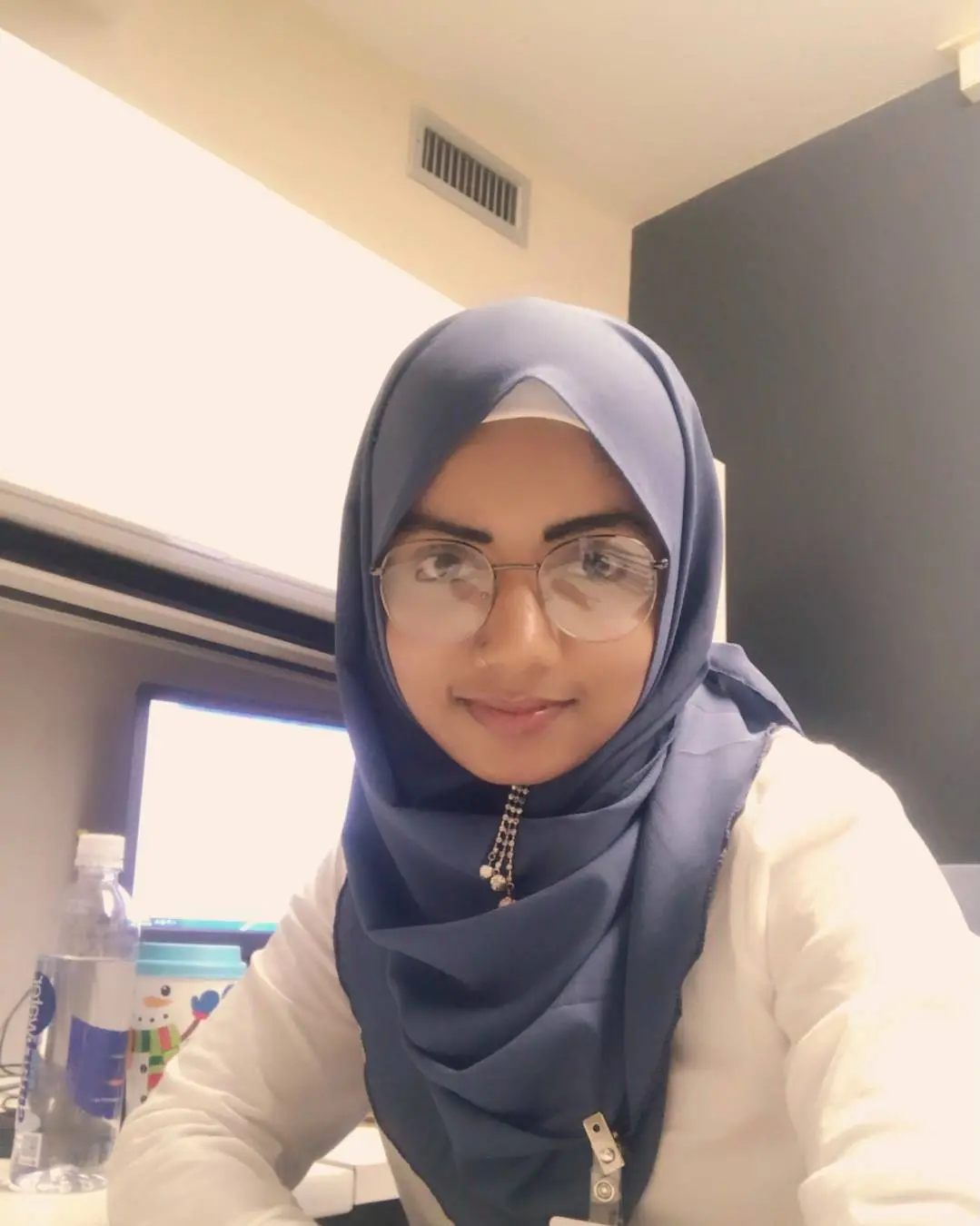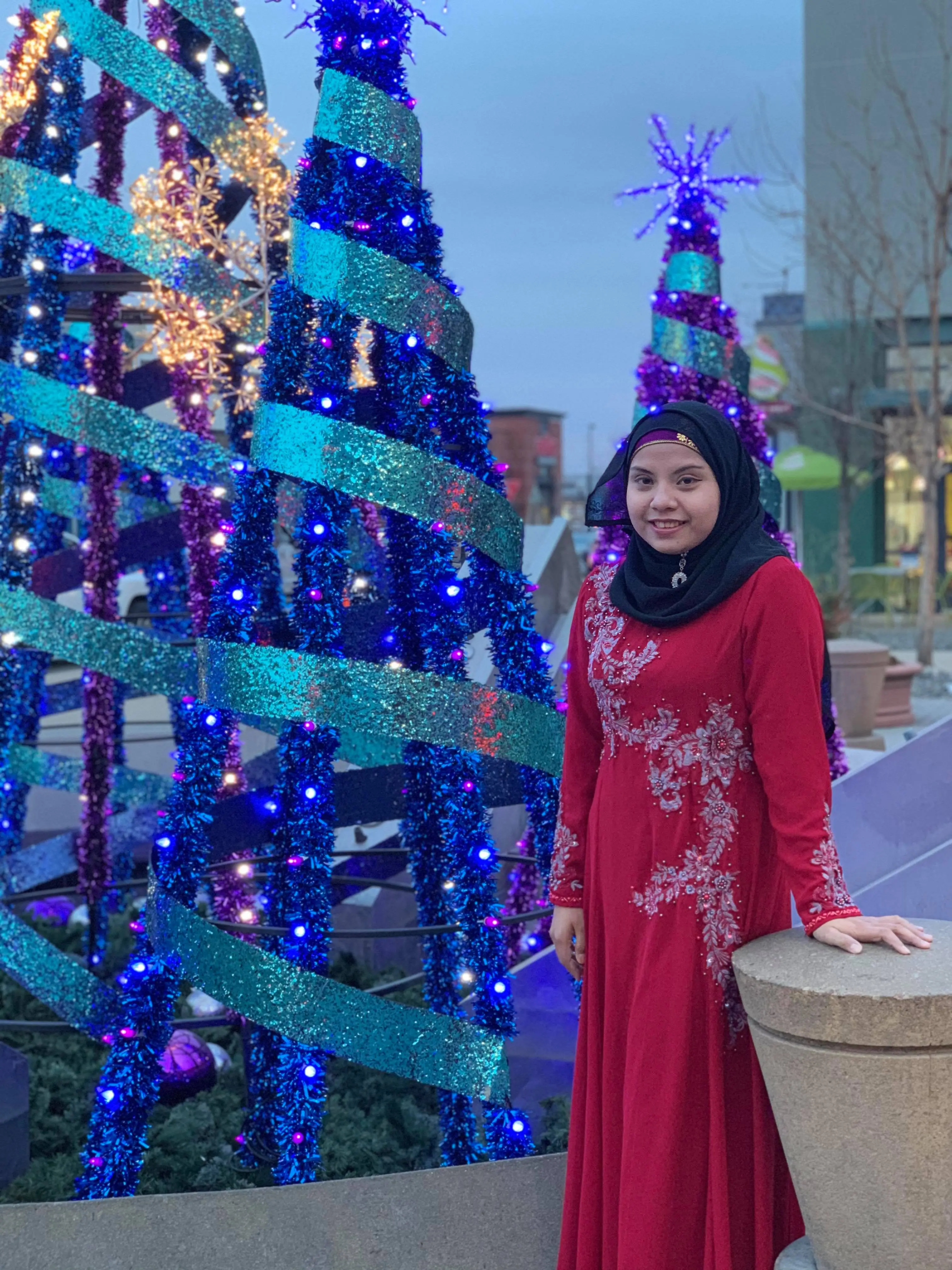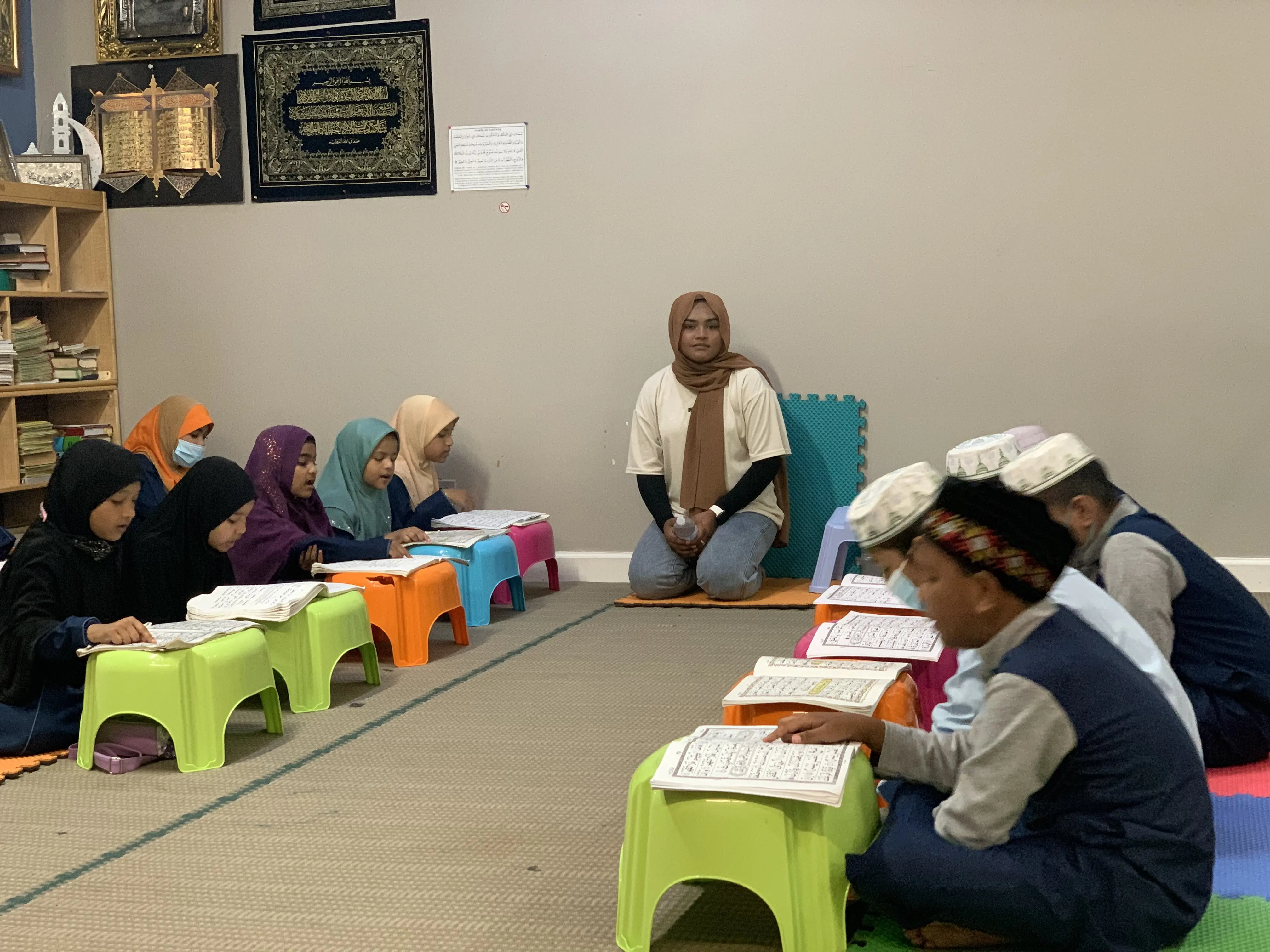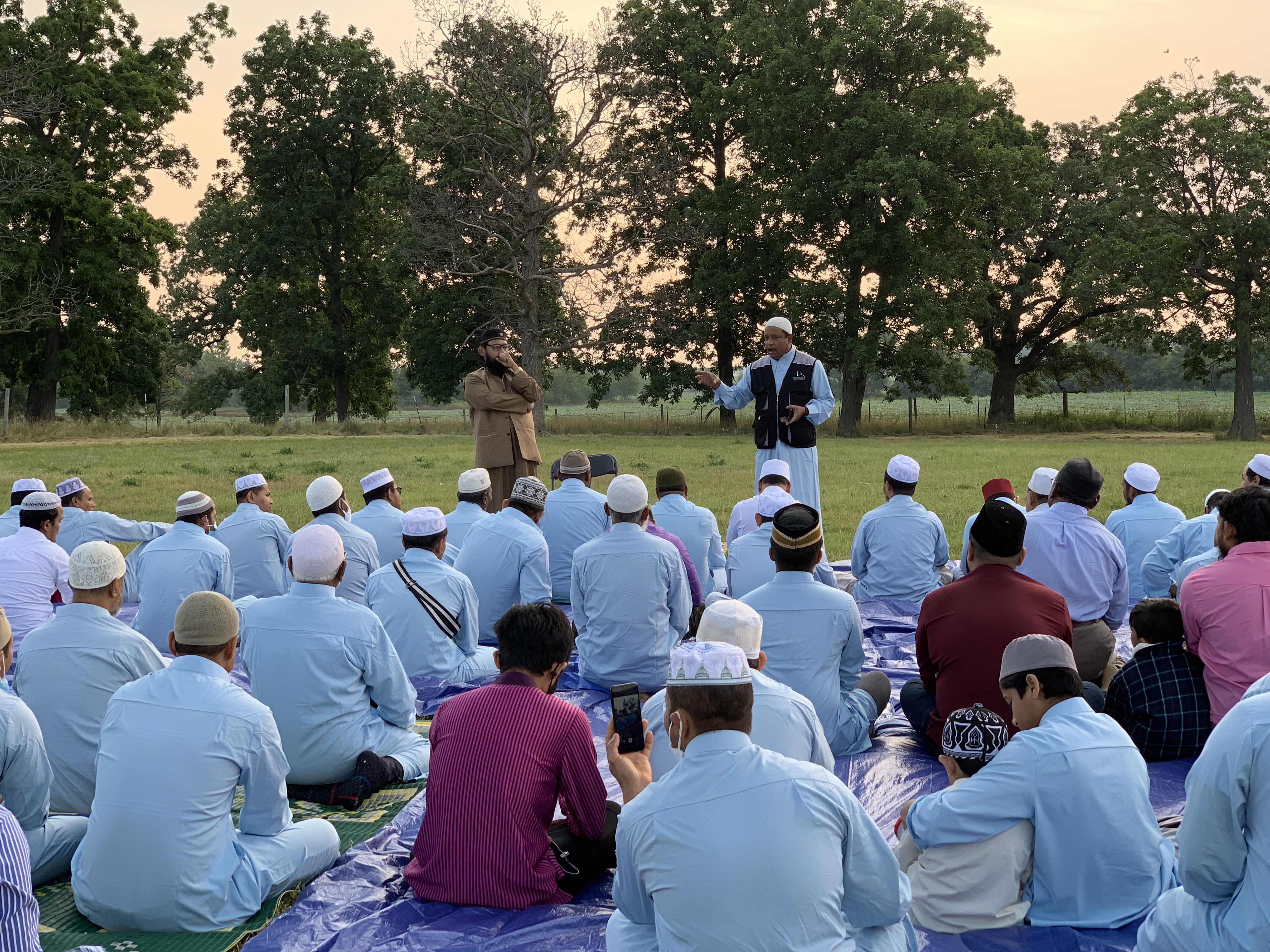An awkward smile shines through the tiny box on the computer screen as Azimah Jalil introduces herself on our Zoom meeting. Her willingness to speak to a stranger and an English accent brings a feeling of modernity in her voice—unusual for Rohingya girls. Wearing a matching gray headscarf and dress, Jalil still preserves her cultural values. She is a Rohingya girl from Rakhine State, Myanmar, and is currently living in Buffalo, New York.

Twenty-year old Jalil recently graduated from SUNY Erie Community College with her associate degree in social science. She has transferred to D’Youville College in New York to obtain her bachelor's degree and become a registered nurse.

As a non-profit journalism organization, we depend on your support to fund more than 170 reporting projects every year on critical global and local issues. Donate any amount today to become a Pulitzer Center Champion and receive exclusive benefits!
“At the age of eleven, I left Myanmar with my family,” Jalil tells me with a deep sigh. “It was like I buried my soul in my room and lost the only identity that defined me and began a journey into the unknown.
“My family and I were traumatized while we were crossing the mountain at night as losing a family member is so common, and at the border of Myanmar, the military shoot anyone. The fishing boat was packed with hundreds of strangers, but we survived and made it to Malaysia,” Jalil says. “We were in a bizarre land and joined other Rohingya in Kuala Lumpur which was like a slum.”
In Malaysia, Rohingya refugees were not allowed to pursue an education or to work even if they had refugee status.
Jalil explains, “It was like everywhere we go, it becomes a new hole because of our statelessness.
“We lived for three and half years in Malaysia, and every day was a struggle of food, rent, or documentation, etc,” she says. “My own country restricted my freedom of movement. And, in Malaysia, going out with my family was still a dream which usually didn’t happen without the police confrontation asking us to show our documentation.”
Despite all these unimaginable hardships, there is a great sense of hope and determination in her voice. “I am a dreamer and all I need is a chance,” Jalil explains. “We arrived in the U.S. in 2015, and I pursued the dreams that I stored in my heart to be educated, help other Rohingya girls’ voices be heard, and empower my community as a whole. I want to be independent, not a burden for my family just because I am a girl.”
Rohingya women are, whenever possible, escorted by male relatives who are very protective. In times of crisis in Rakhine State, there is the fear of rape. Consequently, women tend to be married at 16-18 years old, for safety. This idea continues, even today.
“It hasn’t been easy to get my education as I have so much pressure to get married and have kids. People always say “Hotte Mela Habibi,” meaning ‘when can we eat your wedding meal’,” Jalil tells me as the conversation continues in both English and Rohingya language. “Initially, it was tough to convince my parents, but they see me as a leader for my Rohingya community in Buffalo. People call me day and night for help, and my knowledge has changed my parents' and others’ culturally developed ideas that a girl can’t talk to a stranger.
“I have never known how I would illustrate women's strength to my community, but if there is a will, there is a way, and education paves the way,” she says. “I want the young girls like me in the U.S. to see their full potential and to be an inspiration for them. The work has to start from me.”
Jalil mentors other Rohingya girls in Buffalo and other states. One of them is Nur Kayas Shamsul, who lives in Greeley, Colorado.

Shamsul is a 22-year-old Rohingya girl with a voice hovering between charm and shyness as she speaks without turning her camera on. “I couldn’t develop a sense of belonging to my birthplace as my family left Myanmar to Malaysia when I was only three years old,” Shamsul says.
“Malaysia was everything I knew and I embraced everything including culture, food, and language,” Shamsul says. “I grew up there and thought in the back of my head that I was a citizen, but the reality was I would always be an outsider. My young mind couldn't understand this until I was told that I was not allowed to go to school.”
Shamsul asks, “Who thinks about legal papers or persecution when you are just seven or eight years old and people tell you that you don’t belong here?”
“I grew up with anger inside me,” she says. One day, her dad told her they would go to the U.S. Shamsul, her parents, and her three younger siblings arrived in 2012 on a cloudy and freezing cold day. “I was like I would be cool and calm with the breeze of cold,” she laughs.
“Fitting into the western culture hasn’t been easy with my hijab on in school because there is no program about the cultural diversity in public schools,” Shamsul says. “One day I was using the restroom in my school. Some girls swore at me and pulled my hijab. They said I looked like a terrorist, but I didn’t even know what it was. I ran and never went back to that school again.”
Shamsul managed to finish high school and is studying for her associate degree at Aims Community College in Colorado. She says, “My values are changing. I want to be independent, educated, and have zero tolerance for domestic violence by anyone. That fits with western society but not with my community. It is like I can’t fit with either of them and am losing myself on both sides of the battle.”
Shamsul married after graduating from high school because the pressure overwhelmed her. “My Rohingya husband told me I could continue my education but, after marriage, I was prevented and was told that “melafuandor ham culat” [“girls work is in the kitchen”]. I had to divorce him and went back to my parents' house. She tells me it is considered a curse in my life because our mentality is that once a girl gets married, she only leaves her husband’s home wrapped in white when she dies."
“There are many other girls like me who are finding it hard to have their voices heard,” Shamsul says.
To understand the emotionally complex life of Rohingya girls in the U.S., I met with Nur Hayati at her workplace in Chicago. Hayati is the program manager of after school program for Rohingya children at the Rohingya Cultural Center of Chicago.

Hayati is 21 years old and one of the Rohingya girls in Chicago attending Harold Washington College. She was born in Malaysia where her family lived as refugees. The entire family came to the U.S. in 2011 and found their home in Chicago. Her voice resonates an interesting tone as it depicts Rohingya heritage, Malay, and western cultures.
“Although I was not born in Myanmar, most of my decisions are made by my parents,” Hayati says. “I want to study journalism or photography, but I am studying nursing just to make my parents happy.”
“I want to build a future that allows Rohingya women to explore and work outside their homes,” she states. “It is so difficult for Rohingya women to find work in the U.S. because they are asked if they worked outside in other countries, but they didn’t. Someone will rarely hire them without any work experience. The majority of them are just looking after their kids and a few who work outside their home are just doing cleaning.”
Rohingya people suffered atrocities and experienced a great deal of trauma in Myanmar and other places. Some of them are living in safely in the U.S., but the insecurity created by persecution continues to live with them.
The Rohingya may struggle from anxiety, trauma, stress-related, and post-traumatic disorders without their knowledge as their loved ones are in constant pain since the military took control of power on February 1, 2021. Their memories of murder, rape, and displacement haunt them daily through their relatives' phone calls.
They may not realize that they are passing the disorders onto the next generation. For the younger generation like Jalil, Shamsul, and Hayati, there is anxiety hidden in their faces. They will struggle to find Rohingya males who will understand the values they are developing through their education.
Jalil says, “We are in the middle of the ocean and can’t see the shore.”











